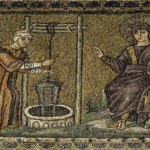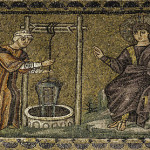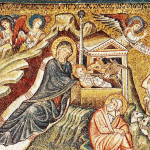We run our website the way we wished the whole internet worked: we provide high quality original content with no ads. We are funded solely by your direct support. Please consider supporting this project.

What is the Kingdom of God (Part 1)
We all know what the Kingdom of God is, right? But this is precisely the problem. Since we are all to a large extent products of our culture, what seems obviously true and right to us will be at least influenced, if not determined, by what seems obviously true and right to our culture. This, I suspect, is why the American church today Christianizes so much of American culture. We give this culture divine authority by slapping the label “Kingdom of God” or “Christian” on it.
A classic case of this is seen in the history of America at war. Instead of simply claiming America should be at war because they think it’s “just” or “in the best interest of our nation,” many Christians, especially Christian leaders, invoke God’s name. The long and bloody history of war has shown that it’s hard to motivate young people to risk getting killed and to kill others unless you can convince them that their tribal god wants them to do it and that he’s on their side. “We fight for god and country” has been the battle cry of pretty much every army throughout history.
We should expect this sort of activity from the fallen kingdoms of the world. But when Christians fuse the Kingdom of God with nationalistic tribalism, the result is catastrophic. The crucified Messiah becomes just one more typical tribal warring deity.
In the name of the one who taught us to bless those who persecute us, we engage in preemptive strikes against those who might threaten us at some point in the future. In the name of the one who commanded us to turn the other cheek when struck, we make sure that we strike their cheek first. In the name of the one who taught us to love our enemies, we bomb them. In the name of the one who was crucified for wrong doers, we crucify those who wrong our national interests.
We need to understand that this idolatrous fusion of the Kingdom of God with nationalistic self-interest is the most common form of idolatry practiced throughout church history. It’s the mindset that fueled the Crusades and the Inquisition. It’s why the history of the church is as bloody as that of any barbaric nation. The fusion of the Kingdom of God with nationalistic self-interest is diabolically tempting precisely because it seems so “obviously right” to those who are part of the nation.
I’m not here to discuss the relative merits of any war. But for God’s sake—literally—don’t pollute the holy name of the crucified Messiah by associating him with violent nationalistic sentiments! The “holiness”—the separateness—of Jesus Christ and the Kingdom he came to establish is desecrated when it’s even remotely associated with this all-too-typical, bloody, kingdom-of-the-world activity.
Before we get into what the Kingdom of God is, we must first refrain from infusing it with every personal, cultural or nationalistic sentiment we happen to feel and that seems “obviously” right to us. When we do this we delude ourselves into thinking we’re advancing the Kingdom of God when, in fact, we’re only advancing our own personal or national self-interest. We “Christianize” our cultural conditioning and become guilty of grotesque idolatry. All of this results from assuming the Kingdom of God is obvious.
The truth is that there’s nothing obvious about the Kingdom of God. In fact, if we allow Scripture to tell us something we don’t assume we already know, we’ll see that the meaning of the Kingdom of God contradicts the most “obvious” truths of our culture and every culture. As is typical, instead of giving us an abstract definition of the Kingdom of God, Scripture gives us a narrative. It is the narrative that is centered on the person of Jesus Christ.
Throughout the Gospels, Jesus is depicted as the perfect embodiment—the incarnation—of “the Kingdom of God.” When Jesus was present, Scripture shows, the Kingdom of God was present. He was, in his incarnate form, the dome in which God was king—the Kingdom of God. According to the New Testament’s story, Jesus planted the mustard seed of the Kingdom with his ministry, death and resurrection. He then gave to the Church, the gathering of all who submit to Christ’s lordship, the task of embodying, living out and expanding this unique Kingdom.
Stay tuned as over the next few days we will be exploring what this means for us as the church and for us as individuals.
Image by Thomas Hawk via Flickr
Category: General
Tags: Holiness, Jesus, Kingdom, Kingdom Living, National Idolatry, Upside-Down Kingdom, War
Topics: Following Jesus
Related Reading

Jesus and the “Favored Nation”
Nationalism lies at the heart of the Old Testament narrative. This concept is intimately wrapped up with the law-oriented covenant God made with the Israelites at Mount Sinai, for at the heart of this covenant is the promise that obedience would bring national security while disobedience would bring national disaster (Deut. 27-28). What we shall…

God is Different Than You Think
The revelation of “[a] God humiliated even unto the cross,” as Pascal put it, flies in the face of what most Jews of Jesus’ time, and of what most people throughout history, have expected God to be. In this light, we can discern the thematic centrality of the cross in Jesus’ many teachings that reverse…

The Cross in the Manger
There has been a strand within the Western theological tradition—one that is especially prevalent in contemporary American Evangelicalism—that construes the significance of the cross in strictly soteriological terms. The cross is central, in this view, but only in the sense that the reason Jesus came to earth was to pay the price for our sin…

The Distinctive Mark of Jesus Followers
Jesus’ teaching to love our enemies was understandably shocking to his original audience—just as it is to us today. Jesus expected much, which is why, after telling his audience to love their enemies he added that if we only love those who love us and do good those who do good to us, we’re doing…

Christ the Center
The center of the Christian faith is not anything we believe; it’s the person of Jesus Christ. The foundation of my faith is a person, not a book and a set of beliefs about that book. Rather than believing in Jesus because I believe the Bible to be the inspired Word of God, I came…

Living Jesus’ Prayer for Forgiveness
Luke 23:34: Jesus said, “Father, forgive them, for they do not know what they are doing.” Could anything be more shocking and yet more beautiful than this prayer? After being whipped, beaten, crowned with thorns, repeatedly mocked, spit upon, sneered at, and pierced with spikes through his wrists and ankles, while slowly suffocating as he…
